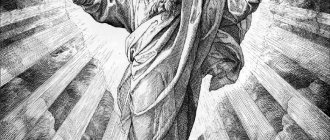| Right Joseph the Beautiful. Greek icon (XX-XXI centuries) |
Joseph the Beautiful
(Heb. יוֹסֵף; Greek. ᾿Ιωσήφ; 17th century BC), biblical patriarch, righteous saint Memory March 31 (ROCOR [1], OCA [2], Bulgarian [3], Czechoslovakia [ 4], Fin. [5]), on Holy Monday, on the Sunday of the Holy Fathers
Righteous Joseph the Beautiful was the son of the Old Testament patriarch Jacob from Rachel. His siblings were jealous of righteous Joseph because his father loved him more than other sons, and they were afraid of him because he told them about his dreams that foreshadowed his future greatness. The brothers decided to kill righteous Joseph, but on the advice of the eldest of them, Reuben, they changed their minds and first threw Joseph into a ditch, and then sold him to merchants who were heading to Egypt with a caravan.
| History of rights. Joseph the Beautiful. Cretan icon |
In Egypt, righteous Joseph was sold to Potiphar, the chief of the royal bodyguards, and, thanks to his intelligence and virtue, earned the trust of his master.
Righteous Joseph was amazingly handsome, and Potiphar's wife wanted to force him into adultery. But the chaste young man rejected the temptation. Then Potiphar’s wife, out of anger and shame, slandered righteous Joseph in front of her husband, as if the young man wanted to defile her. Believing the lie, Potnfar imprisoned the innocent young man. While in prison, Saint Joseph the Beautiful became famous for his wise interpretation of dreams. Having unraveled the dreams of Pharaoh, which foreshadowed the approach of famine and misfortune for Egypt, righteous Joseph was freed and became the first dignitary of Egypt. When famine struck in the homeland of righteous Joseph in Palestine, Saint Joseph the Beautiful helped his father and his entire family move to Egypt. Before his death, Righteous Joseph bequeathed to transfer his bones from Egypt to the Promised Land, which was fulfilled under the holy prophet Moses, 1496 years before the birth of Christ. With the death of Jacob and Joseph, the patriarchal era of biblical history ends.
Through his sons Manasseh and Ephraim, Saint Joseph the Beautiful laid the foundation for two tribes of Israel: Ephraim and Manasseh.
The life of righteous Joseph the Beautiful is narrated in the Bible (Genesis 37 - 50). The memory of Righteous Joseph is also celebrated on Holy Monday, because... his sufferings typified the sufferings of the Savior.
According to Brockhaus, “modern Egyptology looks at the history of Joseph as one of its most precious sources.”
Beauty and Challenge
Living in the house of Pharaoh's courtier, Joseph grew up and matured. Beautiful in face and figure, Potiphar's wife liked him. She came every day to look at him and even tried to seduce him. But the honest and noble young man rejected her and ran away, leaving his outer clothing in her hands.
A rich and noble woman, whose beauty many men could not resist, was offended by the fact that some slave abandoned her. Then she cunningly deceived everyone, saying that the servant was harassing her. Potiphar felt bitter and offended that he trusted Joseph, and he acted so vilely. Inflamed with anger, the courtier sent Joseph to prison.
[edit] Sources
- Gen.44:18
- Josephus Flavius. The Antiquities of the Jews, Book II, 7.1.168
- Mehler, S. From Light Into Darkness: The Evolution of Religion in Ancient Egypt, (ISBN 1-931-88249-5, ISBN 978-1-931-88249-1), 2005
- Josephus Flavius. The Antiquities of the Jews, Book II, 6.1.91
- Pinchas Polonsky
Jewish “national form of idolatry” // Commentary on the Torah. - Louis H. Feldman
Josephus's interpretation of the Bible. - University of California Press, 1998. - 837 p. - Joachim Friedrich Quack: Ein ägyptisches Handbuch des Tempels und seine griechische Übersetzung
.
In: Zeitschrift für Papyrologie und Epigraphik
; vol. 119; Rudolf Habelt, Bonn 1997, pages 297–300. - CH Gordon: Before the Bible: The common background of Greek and Hebrew civilization
;
in: Orientalia
, vol. 22; 1953, pages 79–81. - Shaul Bar: A letter that has not been read: dreams in the Hebrew Bible
. Hebrew Union College Press, Michigan 2001, ISBN 0-87820-424-5, pages 58 & 59.
Christ
- Divine providence overcame the wickedness of the Jews (Gen. 3:15; John 10:17,18; Rom. 6:23)
- Jesus is the Only Begotten Son of God (John 3:16)
- Jesus is sent on a mission of salvation (John 1:29; 3:17; Luke 19:10; Rom. 6:23; 1 John 4:14)
- Jesus is rejected by His people because of unbelief (John 1:11,12; Zech. 13:6)
- Jesus was hated because He proclaimed Himself to be king (Matt. 2:1-18; 28:18; Luke 1:26-35; Acts 2:22-30)
- Jesus' clothes were stripped (Matt. 27:35; Mark 15:24; John 19:23,24)
- Jesus was sold for thirty pieces of silver (Matthew 26:15; 27:3-5)
- Jesus' enemies thought they were rid of Him (Mark 15:13,14,29-31; Isa. 53:10-12)
- Later, His enemies had to face His resurrection (1 Cor. 15:1-8)
- Jesus' enemies obtained false witnesses and bribed them to lie about His resurrection (Matthew 28:11-15)
- Jesus was tempted, but did not sin (Matt. 4:111; Heb. 4:15; 1 Pet. 2:22)
- Jesus became a ruler and calls everyone to salvation (Matthew 11:28-30; Mark 16:15-16; John 14:1-4)
- Jesus forgives and has mercy on sinners (Luke 23:34; Mark 16:15,16; Heb. 5:9)
- Jesus is preparing heaven for us (John 14:1-4; Heb. 4:9; Rev. 21:4)
Amazing "Egyptian"
The same story tells that the family of Jacob, who came from Judea, was served food separately. They also gave special food to Joseph and the Egyptians. “The Egyptians cannot eat with the Jews,” because “it is an abomination to the Egyptians.” Joseph immediately warns his brothers: “Pharaoh will call you and ask: “What is your occupation?” Answer: “We have been herders until now.” For “every shepherd of sheep is an abomination to the Egyptians.”
Despite such difficult relations between peoples, he gained the respect of the king of Egypt. In those days it was a strong and powerful country. And it was quite difficult to gain the favor of its ruler and recognition. Joseph succeeded. He was so valuable in the eyes of the Egyptian people that Pharaoh treated Joseph's entire family kindly.
Reading this story, you understand how unusual a person Joseph of Egypt was. The aphorisms associated with her, even in our time, remind us of the amazing Egyptian.
Thus, by “Pharaoh’s cows” a person, as a rule, means someone for whom nothing is going well, or a situation that cannot be corrected by any effort. In the artistic community, this is the name given to people without talent who benefit from the activities of their talented colleagues.
When discussing financial problems and the crisis, publicists often use the aphorism “seven skinny cows” or “time for skinny cows.” And Joseph the Beautiful can be called a beautiful and pure young man to whom temptations are alien.
From prison to palace
After some time, the butler and the baker committed offense before the king of Egypt. He became angry and ordered the latter to be taken into custody. And they threw them into prison, where Joseph was already sitting.
One day these prisoners had dreams. In the morning Joseph found them confused and puzzled, since they could not understand the meaning of their visions. Joseph explained everything, telling the baker that he would be executed, and promised the cupbearer favor in the eyes of the king and predicted faithful service to Pharaoh.
Joseph asked the cupbearer: “Let the Egyptian king know about me. That I was stolen from the land of the Jews and undeservedly thrown into prison.” Three days later everything happened as Joseph predicted. The baker was executed, and the cupbearer was again returned to serve the king. But he forgot the promise he made to Joseph - to put in a word before the king of Egypt. And Joseph remained in prison.
Patience is rewarded
Jacob gathered together all his livestock and property, all his children and grandchildren. He brought his entire family to Egypt. Pharaoh gave them the best lands and entrusted them with his livestock. Jacob and his entire family lived for many years in Egypt. All affairs in the land of Egypt were managed by his son Joseph. Pharaoh trusted him and appreciated him for his wisdom and courage.
This is the story of patience and hope that helped Joseph not only survive, but also become second after the king of Egypt. In order to understand how great and unusual Joseph’s path was, you need to know what Judea and Ancient Egypt were like in those days and what were the relations between the peoples who inhabited these lands.
Egyptian slavery
At first, the Jews lived well in Egypt. But the new pharaohs who ascended the Egyptian throne began to forget Joseph and his merits. They began to fear the increase of the Jewish people, they were afraid that the Jews would become stronger than the Egyptians and rebel against them. The pharaohs began to exhaust them with hard work. But the more they were exhausted, the more they multiplied. Then one of the pharaohs ordered to kill all boys born to Jews.
At a time when the Jews were still living well, they began to forget God and began to adopt pagan customs from the Egyptians. Now, when troubles began, they remembered God and turned to Him with a prayer for salvation. The merciful Lord heard them and sent them deliverance through the prophet and leader Moses
.
Note
: see the Bible, in the book. "Exodus": ch.
1
.
The story of long-suffering Job
In very ancient times, there lived a righteous man named Job to the east of Palestine. He was a fair and kind man who always tried throughout his life to please God. The Lord rewarded him with great benefits for his piety. He had many hundreds of large and thousands of small livestock. He was comforted by his large and friendly family: he had seven sons and three daughters.
But the devil was jealous of Job. He began to slander God about the righteous Job: “Is Job fearing God (righteous) for nothing? Take away from him everything he has, will he bless You?” God, in order to show everyone how faithful Job was to Him, and to teach people patience in their suffering, allowed the devil to take away everything that Job had. And so, one day, robbers stole all of Job’s livestock, killed his servants, and a terrible whirlwind from the desert destroyed the house in which Job’s children had gathered, and they all died. But Job not only did not grumble against God, but said: “God gave, God has also taken away: blessed be the name of the Lord.”
».
The shamed devil was not satisfied with this. He again began to slander Job: “A man will give his life everything that he has: but touch his bones, his body (that is, strike him with illness), and you will see whether he will bless you?” God allowed the devil to deprive Job of his health as well. And then Job fell ill with the most terrible disease - leprosy. Then even Job’s wife began to persuade him to say a word of grumbling against God, and his friends, instead of consoling him, only upset the innocent sufferer with their unfair suspicions. But Job remained firm, did not lose hope in God’s mercy and only asked the Lord to testify that he endured everything innocently.
In a conversation with friends , Job prophesied about the Redeemer (the Savior) and the future resurrection: “I know that my Redeemer lives, and on the last day He will raise from the dust this decaying skin of mine, and I will see God in my flesh. I will behold (see) Him myself; it is my eyes, and not the eyes of another, that will see Him.”
(Job.
19
, 25-27).
After this, God, having shown everyone an example of fidelity and patience in His servant Job, Himself appeared and ordered his friends, who looked at Job as a great sinner, to ask him for prayers for themselves. God rewarded His faithful servant. Job's health returned. He again had seven sons and three daughters, and his livestock was twice as large as before, and Job lived another hundred and forty years in honor, calmly, piously and happily.
The story of long-suffering Job teaches us that God sends misfortunes not only for sins, but sometimes God also sends misfortunes to the righteous to further strengthen them in goodness, to shame the devil and to glorify the truth of God. Then the story of Job’s life reveals to us that earthly happiness does not always correspond to a person’s virtuous life and also teaches us to be compassionate towards the unfortunate.
Job, with his innocent suffering and patience, prefigured the Lord Jesus Christ. Therefore, during the days of remembrance of the suffering of Jesus Christ (on Holy Week), a narrative from the book of Job is read in church.
Note
: See the Bible, in the Book of Job.
Sold for pieces of silver
When Joseph found his brothers in Dothan, they stripped him of his coat of many colors, threw him into a ditch, and then sold him to the Ishmaelites for twenty pieces of silver (Gen. 37:23-28).
Jesus was betrayed (sold) for thirty pieces of silver.
15 And he said, What will you give me, and I will deliver Him to you? They offered him thirty pieces of silver; (Matt. 26:15)
3 Then Judas, who had betrayed Him, saw that He was condemned, and repented, and returned the thirty pieces of silver to the chief priests and elders, 4 saying, “I have sinned in betraying innocent blood.” They said to him: What is that to us? take a look yourself. 5 And throwing away the pieces of silver in the temple, he went out, went and hanged himself. (Matt.27:3-5)
Jesus' clothes were taken off and lots were cast to see who would get them.
35 And those who crucified Him divided His garments, casting lots; (Matt. 27:35)
24 Those who crucified Him divided His garments, casting lots as to who should take what. (Mark 15:24)
23 When the soldiers had crucified Jesus, they took His clothes and divided them into four parts, a piece for each soldier, and a tunic; The tunic was not sewn, but entirely woven on top. 24 So they said to each other, “Let us not rend it, but let us cast lots for it, whose it will be, so that what is said in the Scripture may be fulfilled: They divided my garments among themselves, and cast lots for my clothing.” This is what the warriors did. (John 19:23,24)
The division of His clothes and the casting of lots for them fulfilled David's prophecy.
19 They divide my garments among themselves and cast lots for my clothing. (Ps. 21:19)
Temptation
Another striking similarity between Joseph and Jesus is that they both suffered temptation.
Potiphar's wife tempted Joseph to commit adultery with her, but Joseph remained pure (Gen. 39:7-12).
Jesus was also tempted, but did not sin.
1 Then Jesus was led up by the Spirit into the wilderness to be tempted by the devil, 2 and having fasted forty days and forty nights, he was finally hungry. 3 And the tempter came to Him and said, If You are the Son of God, command that these stones become bread. 4 And he answered and said unto him, It is written, Man shall not live by bread alone, but by every word that proceedeth out of the mouth of God. 5 Then the devil takes Him to the holy city and places Him on the pinnacle of the temple, 6 and says to Him, If You are the Son of God, throw yourself down, for it is written: He will command His angels concerning You, and in their hands they will bear You up, lest You dash Your foot against a stone . 7 Jesus said to him, “It is also written, ‘Thou shalt not tempt the Lord thy God. 8 Again the devil takes Him to a very high mountain and shows Him all the kingdoms of the world and their glory, 9 and says to Him: I will give all this to You if you fall down and worship me. 10 Then Jesus saith unto him, Get thee behind me, Satan: for it is written, Thou shalt worship the Lord thy God, and him alone shalt thou serve. 11 Then the devil left Him, and behold, the angels came and ministered to Him. (Matt.4:1-11)
22 He committed no sin, and no flattery was found in His mouth. (1 Peter 2:22)
He was “in all points tempted as we are, yet without sin.”
15 For we do not have a high priest who cannot sympathize with our weaknesses, but one who has been tempted in all points like [us], yet without sin. (Hebrews 4:15)






